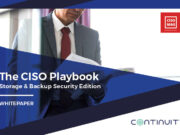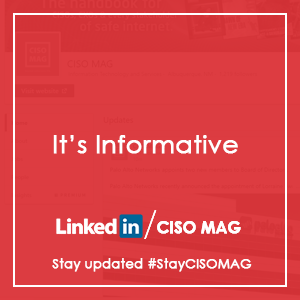Trending Now
CYBERSECURITY INDUSTRY NEWS AND FEATURES
All
- All
- BUDGET
- Careers
- DATA PRIVACY
- Editorial
- EXCLUSIVE
- Explainers
- Featured
- Features
- Governance
- Hotspot
- Infographics
- Infosec Superwomen
- Innovator’s corner
- Interviews
- Market Trends Report
- NATIONAL CYBERSECURITY AWARENESS MONTH
- News
- One Quick Question
- Partnerships
- Podcasts
- Reading Room
- REGULATIONS & COMPLIANCE
- Sponsored Content
- Startups
- Threats
- Trends and Predictions
- Upcoming Events
- Video Interviews
- Webinars
- Whitepapers
- Women in Cybersecurity
- Workforce
UPCOMING EVENTS
The 2nd Women In Cyber
April 25, 2024
Location: Putrajaya, Malaysia
The 2nd edition of Women in CYBER 2024 (WIC 2024) is set to take place on 25th...
St. Louis Cybersecurity Conference
April 25, 2024
Location: St. Louis, Missouri
Come together with fellow cybersecurity professionals at the St. Louis Cybersecurity Conference, your gateway to gathering invaluable...
AI in Cyber Online
May 8, 2024
Location: Online
As technology reshapes the global scene, fortifying digital defenses against evolving cyber threats is critical. In the Asia Pacific...
4th Annual Cybersecurity and Threat Intelligence Summit & Awards 2024 (CSTI)
May 14 – 15, 2024
Location: Kuala Lumpur, Malaysia
3novex CISO Series aims to bring together CISOs and key-players from reputable organisations to present...
WHITEPAPER
The CISO Playbook: Storage & Backup Security Edition
Of the three main IT infrastructure categories — compute, network, and storage — the latter often holds the greatest value, from both security and business...
How to Ensure Data Management Excellence
In response to high-profile data breaches, staggering fines, and rapidly evolving privacy and data requirements, CIOs and CISOs are facing a critical mandate: to...
Implementing Digital Forensics in Emerging Technologies
Technology is progressing at an astounding rate, and while at it, it is also connecting the digital world in a way never seen before....
MARKET TRENDS REPORT
Blockchain technology has sparked interest across all industry types due to its prime feature of data immutability and distributed consensus helping to secure and validate data across the internet. Organizations aspire to boost their business with the help of...
Cloud computing is transforming digital and IT infrastructure at an astounding pace. The pandemic and changing business models have prompted many businesses to migrate their digital operations and storage to the cloud. Today, it is common practice for an...
Computer Forensics is now known as Digital Forensics and the task of uncovering digital evidence is more challenging than ever. It now involves governments and multiple jurisdictions. Today, forensic experts would need to travel to different countries to find...
The concept of cybersecurity is about solving problems. These can be problems related to sensitive data, financial data, seamless workflow, functions, or simply network-related security issues. However, there is one problem that has been dwarfing the growth of cybersecurity...
HOTSPOTS
Defend Your Data with a Sense of Sertainty
Sertainty Self-Protecting-Data is an advanced technology that provides data the awareness to act and react, enabling security directly at the data layer.
Have a look...
CYBERSECURITY STARTUPS
How FireCompass is Shaping the Future of Security Testing
With the volume of attacks on enterprises increasing by the day, it is no longer sufficient to do occasional or manual penetration testing. Organizations...
In ByteChek, Companies Can Find the “X” Factor for Cybersecurity Compliance
In today's hyper-connected world, cyberthreats are continuously evolving. This is why establishing a risk-based control to protect the integrity, confidentiality, and accessibility of business...
INFOGRAPHICS
GOVERNANCE
All
- All
- BUDGET
- Careers
- DATA PRIVACY
- Editorial
- EXCLUSIVE
- Explainers
- Featured
- Features
- Governance
- Hotspot
- Infographics
- Infosec Superwomen
- Innovator’s corner
- Interviews
- Market Trends Report
- NATIONAL CYBERSECURITY AWARENESS MONTH
- News
- One Quick Question
- Partnerships
- Podcasts
- Reading Room
- REGULATIONS & COMPLIANCE
- Sponsored Content
- Startups
- Threats
- Trends and Predictions
- Upcoming Events
- Video Interviews
- Webinars
- Whitepapers
- Women in Cybersecurity
- Workforce
PRIVACY
There Will Be More Focus on Data Privacy, IT-OT Security, and...
By the end of 2023, modern privacy laws will cover the personal information of 75% of the world’s population. Data privacy is gaining momentum in...
STARTUPS
NCSC for Startups Initiative will Address U.K.’s Cybersecurity Challenges
Bringing the technical expertise of both public and private organizations will help mitigate security gaps and boost the overall cybersecurity posture in the country....



































![How To Find a Phishing Email [INFOGRAPHIC] Phishing email](https://cisomag.com/wp-content/uploads/2021/10/MicrosoftTeams-image-38-341x220.png)




![Five Phishing Baits You Need to Know [INFOGRAPHIC] Phishing Campaign on FINRA](https://cisomag.com/wp-content/uploads/2019/03/Phishing-Attacks-80x60.jpg)
![Ghost of the Cyber Past, Present, and Future [INFOGRAPHIC] Gift Cards, cyber ghosts](https://cisomag.com/wp-content/uploads/2020/12/christmas-sale-concept-black-friday-green-cyber-monday-background-with-laptop-tablet-christmas-decor-gift-boxes-768x513-1-80x60.jpg)
![Are You a Thought Leader CISO? [INFOGRAPHIC] 1 in 3 CISOs feel biggest challenge of endpoint solution is its complexity](https://cisomag.com/wp-content/uploads/2019/11/cape-crusader-80x60.jpg)

![Time to Get Back to Normal Or Should We Say Digital Normal! [Infographic]](https://cisomag.com/wp-content/uploads/2020/10/Business-in-the-Post-Pandemic-Era-80x60.jpg)
![State of Enterprise IT Landscape [INFOGRAPHIC]](https://cisomag.com/wp-content/uploads/2019/05/Cloud-Security-80x60.jpg)

































